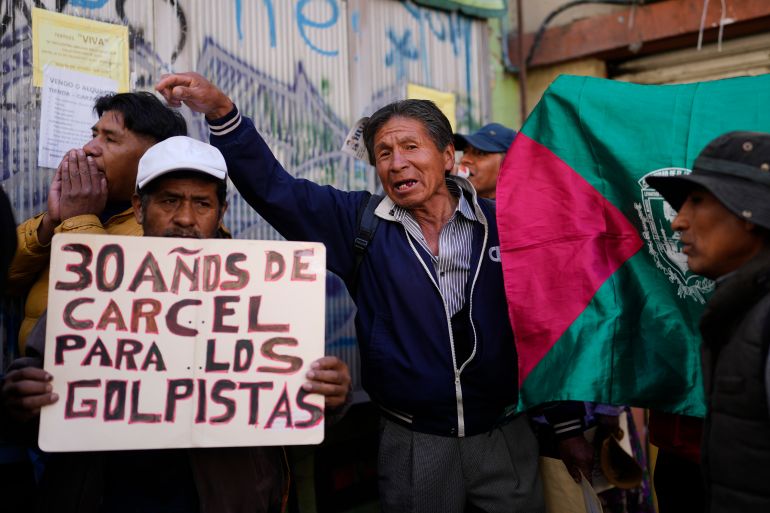In response to outcry over the length of his pretrial detention, a court in Bolivia has placed prominent opposition leader Luis Fernando Camacho under house arrest.
According to a court order issued on Wednesday, Camacho, the right-wing governor of the eastern department of Santa Cruz, could be released from preventative detention on bail if he agrees to house arrest.
On Friday, he will return to Santa Cruz, the capital of Bolivia’s most populous city, via the name Santa Cruz.
His attorney, Martin Camacho, confirmed on Wednesday that the judicial body had recommended the end of Governor Luis Fernando Camacho’s preventive detention and that it had been replaced with house arrest.
According to the attorney, Governor Camacho could resume performing his political duties under his bail’s work-release conditions.
Bolivia’s political landscape changes
Camacho was detained in December 2022 after being detained in response to weeks of bloody protests he led by right-wingers angry with La Paz’s left-wing political leadership. Since then, he has been in pretrial detention.
Pre-trial detention in Bolivia typically shouldn’t last longer than six months. Camacho’s release was approved on Tuesday after the Supreme Court of Justice requested a review of his sentence last week.
A second judge opted to place Camacho instead of being put under house arrest after the hearing on Wednesday.
Following Tuesday’s decision, Camacho declared, “This is the first step toward freedom.” The justice’s elected representatives are regaining the rule of law today.
Camacho’s release coincides with a significant change in Bolivia’s political landscape. For the most part, the country has been under the control of the left-wing Movement for Socialism (MAS) party for the past 20 years.
However, all of the left-wing presidential candidates were eliminated from contention in the general election on August 17.
Instead, centrist Senator Rodrigo Paz and former president Jorge “Tuto” Quiroga, who both pledged more radical change, have advanced to the run-offs.
In contrast, Camacho has gained notoriety as a leader of Bolivia’s far-right Christian group, Creemos, which means “We Believe.” He was even given the nickname “Bolivian Bolsonaro,” in honor of former Brazilian president Jair Bolsonaro, who is currently on trial for allegedly conspiring to overturn an election.
Camacho is facing “terrorism”-related charges in La Paz’s Chonchocoro prison for his part.
Although those charges are still ongoing, Wednesday’s release from house arrest is not.
Camacho’s case
Camacho is still facing legal issues, including two well-known cases that put him in jail.
The first is related to his actions during the 2019 political crisis, during which former president Evo Morales fled.
Morales is regarded as Bolivia’s first indigenous leader in recent memory, but he had a controversial campaign for a fourth term in the 2018 general election.
Camacho became a well-known opposition figure in the months that followed, calling Morales’ victory a “fraud.”
In a campaign Morales compared to a “coup,” he and other conservative leaders pressured the then-president to resign.
Camacho, who was carrying a Bible in hand, wrote a symbolic resignation letter to Morales’s country departure letter. Camacho is accused of sedition and “terrorism” for his role in the political crisis.
Camacho’s actions during the unrest in Santa Cruz in 2022 are the second most significant case in his favor. He is facing criminal charges for using public property without permission.
Luis Arce, Morales’ former finance minister, was elected president of Bolivia by 2022, continuing the trend of MAS-led governments in La Paz.
Santa Cruz, which is regarded as Bolivia’s richest economic hub and the largest by land area, had anticipated increases in the upcoming census, which could lead to greater legislative representation.
The Arce government announced the census would be delayed because of the COVID-19 pandemic’s disruptions, but
Santa Cruz’s streets were infuriated by the decision. A powerful right-wing organization led by Camacho led a strike that lasted nearly 36 days.
Protesters squabbled with law enforcement, set fires, and blocked roads. The government ombudsman received reports of numerous human rights violations, including sexual assault and murder. Camacho is accused of being a compliciter in the chaos by the prosecution.

Camacho’s release sparked polarized opinions.
However, the Supreme Court of Justice has requested that the charges against Camacho and other prominent opposition figures, including Marco Antonio Pumari and Jeanine Anez, be reviewed.
Prior to the run-off on October 17, Quiroga has fought for the release of the imprisoned opposition figures.
Quiroga expressed excitement over Camacho’s imminent release on his Facebook page on Tuesday.
“Justice cannot be used to exact retaliation. It must be the foundation of a free and democratic Bolivia, Quiroga wrote.
“I applaud the release of Marco Pumari and Luis Fernando Camacho so that they can pursue their freedom-defending efforts. Let’s move forward and keep in mind that all people have hope when justice is attained.
Camacho’s anticipated return was also celebrated by supporters in Santa Cruz.
Some protesters, however, demanded that he be kept in jail outside the La Paz court. Camacho was cited as the cause of the unrest that resulted in the death of at least 37 people during the political crisis in 2019.
Source: Aljazeera

Leave a Reply